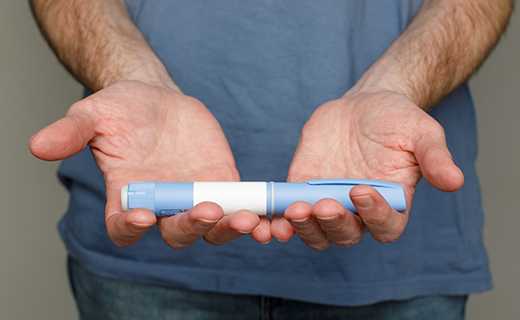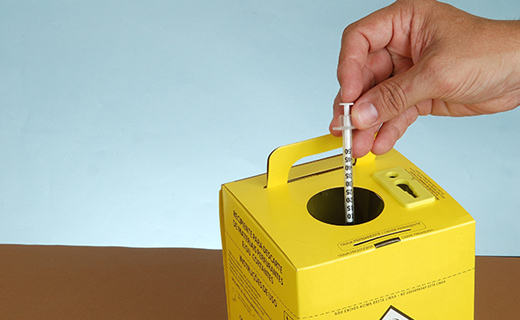GLP-1 Medications
Our specialists offer leading treatments like GLP-1 medications to help you manage diabetes.
Medically reviewed by Jose Joaquin Lado Abeal, M.D. on Oct. 18, 2024.

National Leaders in Diabetes Care and Treatments
Our diabetes experts stay at the forefront of their field by leading continuous research and clinical trials. This gives you access to the latest medical innovations and state-of-the-art treatments in a caring environment. At UC Davis Health, you’ll find comprehensive and compassionate diabetes care.
What Are GLP-1 Agonists?
When you have type 2 diabetes, your pancreas does not produce enough insulin to balance your blood sugar levels. Glucagon-like peptide-1 (GLP-1) is a natural hormone your body produces that tells your pancreas to make more insulin. People with diabetes often have low levels of the GLP-1 hormone.
A GLP-1 agonist is a medication that acts like the GLP-1 hormone in your body. It stimulates insulin production to keep your blood sugar at healthy levels. It can also help you achieve and maintain a healthy weight, which is important for managing diabetes.
There are two forms of GLP-1 medications:
Injection
Several GLP-1 agonists come in injection form. Your dosing will depend on the medication we recommend. Some require daily injections, while others require only weekly injections.
Oral
Currently, one type of GLP-1 medication comes in an oral tablet. You swallow one tablet with water per day, 30 minutes before eating, drinking or taking any other medications.
Request an Appointment
As Sacramento's No. 1 hospital, you'll benefit from unique advantages in primary care and specialty care. This includes prevention, diagnosis and treatment options from experts in 150 specialties.
Referring Physicians
To refer a patient, submit an electronic referral form or call.
800-4-UCDAVIS
Patients
Call to make an appointment.
Consumer Resource Center
800-2-UCDAVIS
You inject GLP-1 medications into a layer of fat beneath your skin. Recommended injection sites include your abdomen, backs of your arms, hips and outer thighs. Your provider will provide specific instructions on how to do your injections.
-

Step 1
Choose where you will inject your medication. If you also give yourself insulin, pick a different location for your GLP-1 medication.
-

Step 2
Pinch your skin. Insert the needle straight into your skin and keep it straight as you press the button to inject the medication.
-

Step 3
Use each needle only once. Place your used needle in a sharps disposal container when you are finished.
Side Effects and Risks of GLP-1 Medications
You may experience side effects while taking a GLP-1 agonist. Research also links GLP-1 medications to an increased risk of developing some health conditions.
Common Side Effects
The most common side effects include constipation, diarrhea, nausea, reduced appetite and vomiting.
Emergency Side Effects
Seek medical care right away if you experience dizziness, shortness of breath, severe abdominal pain or swelling in your neck.
Possible Health Risks
Taking GLP-1 medications may increase your risk of diabetic retinopathy, kidney damage, low blood sugar, pancreatitis, and thyroid cancer.
“GLP-1 Receptor Agonists and the Risk of Thyroid Cancer,” Diabetes Care, https://diabetesjournals.org/care/article-abstract/46/2/384/147888/GLP-1-Receptor-Agonists-and-the-Risk-of-Thyroid?redirectedFrom=fulltext

Ranked among the nation’s best hospitals
A U.S. News & World Report best hospital in cardiology, heart & vascular surgery, diabetes & endocrinology, ENT, geriatrics, neurology & neurosurgery, and pulmonology & lung surgery.

Ranked among the nation’s best children’s hospitals
U.S. News & World Report ranked UC Davis Children’s Hospital among the best in pediatric nephrology, orthopedics*, and pulmonology & lung surgery. (*Together with Shriners Children’s Northern California)

Ranked Sacramento’s #1 hospital
Ranked Sacramento’s #1 hospital by U.S. News, and high-performing in aortic valve surgery, back surgery (spinal fusion), COPD, colon cancer surgery, diabetes, gynecological cancer surgery, heart arrhythmia, heart failure, kidney failure, leukemia, lymphoma & myeloma, lung cancer surgery, pacemaker implantation, pneumonia, prostate cancer surgery, stroke, TAVR, cancer, orthopedics, gastroenterology & GI surgery, and urology.

The nation’s highest nursing honor
UC Davis Medical Center has received Magnet® recognition, the nation’s highest honor for nursing excellence.

World-class cancer care
One of ~59 U.S. cancer centers designated “comprehensive” by the National Cancer Institute.

A leader in health care equality
For the 13th consecutive year, UC Davis Medical Center has been recognized as an LGBTQ+ Healthcare Equality Leader by the educational arm of America’s largest civil rights organization.

